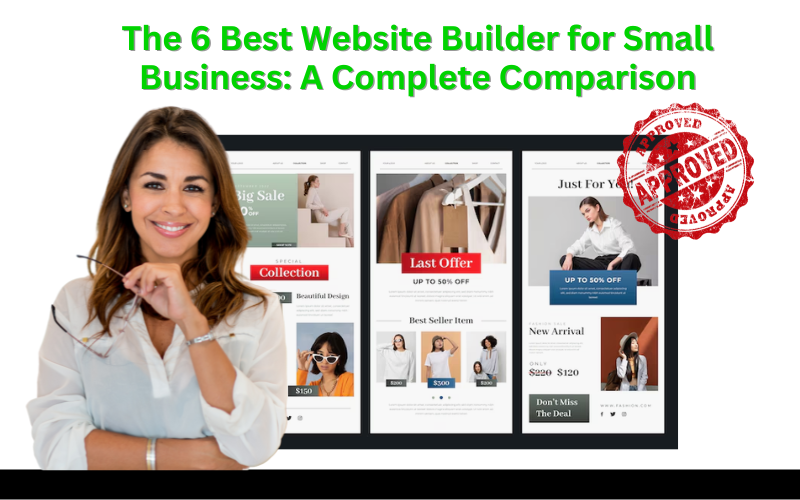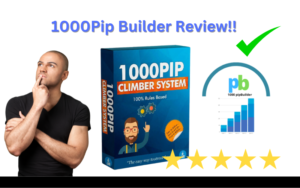Choosing the best website builder for small business is crucial for establishing your online presence and reaching more customers. With so many platforms to choose from, finding the right one that fits your needs can be overwhelming.
Whether you’re looking for ease of use, great design options, or powerful e-commerce tools, this guide will walk you through the top 6 website builders, comparing their features, pricing, and more. By the end, you’ll be ready to pick the best platform to help your small business thrive online.
Table of Contents
1. Wix – Best for Beginners and Customization
Wix is known for its user-friendly, drag-and-drop interface, making it a great option for small business owners with no coding experience. It’s extremely versatile, allowing users to build anything from blogs to full-scale e-commerce stores.
- Ease of Use: Wix excels in ease of use with its intuitive drag-and-drop editor, which requires no technical knowledge. It’s perfect for beginners who want to design a custom website quickly.
- Pricing: Plans start at $16/month, and Wix also offers a free plan with Wix-branded ads. Premium plans remove ads and offer more features, including a domain name.
- Design Options: With over 800 professionally designed templates, Wix provides options for virtually every industry. The templates are fully customizable to suit your branding.
- SEO Features: Wix comes with a built-in SEO Wiz that helps guide beginners in optimizing their website. It covers important factors like meta tags, URL structure, and alt-text for images.
- E-commerce Capabilities: Wix offers integrated e-commerce features for small businesses, including inventory management, payment gateways, and product pages.
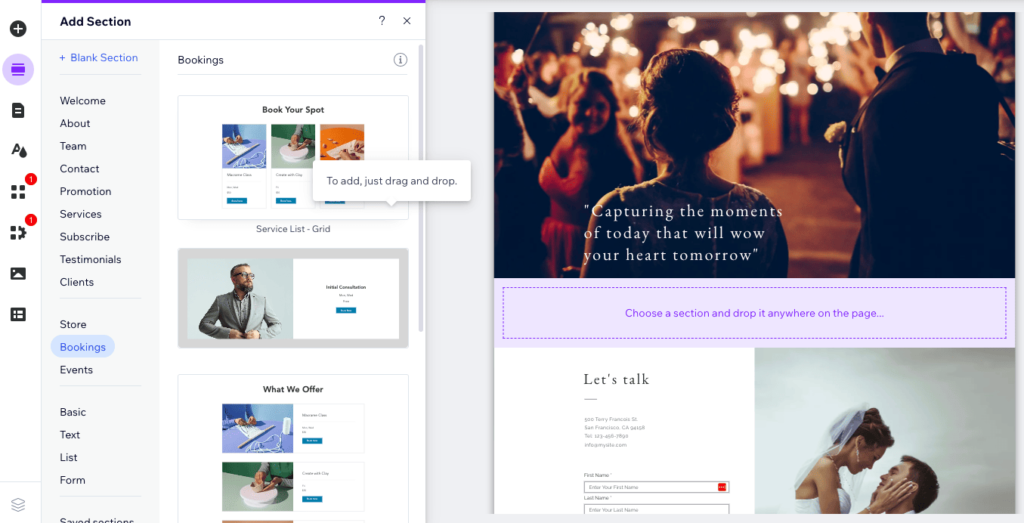
2. Squarespace – Best for Stunning Design
Squarespace is widely praised for its beautifully designed templates, making it ideal for businesses in creative fields or those that want a visually appealing website. It offers a sleek interface with a range of customization options, perfect for showcasing a professional brand.
- Ease of Use: Although it’s slightly more complex than Wix, Squarespace offers a streamlined design experience with a visual editor. It’s best suited for users with a bit of tech savvy or those who want high design flexibility.
- Pricing: Squarespace plans start at $16/month, with no free plan available. This includes essential features like unlimited bandwidth and mobile optimization.
- Design Options: Squarespace is known for its high-quality, modern templates. All templates are responsive, meaning they look great on any device. Squarespace offers fewer templates than Wix, but each one is meticulously crafted.

- SEO Features: Squarespace offers built-in SEO settings, such as the ability to manage titles, meta descriptions, and image alt-text. Its SEO tools are highly regarded for their depth and ease of use.
- E-commerce Capabilities: Squarespace includes full e-commerce functionality, supporting product pages, inventory management, and various payment methods.
3. Shopify – Best for E-Commerce
If your small business is centered around online sales, Shopify is one of the best website builders for e-commerce. It’s a dedicated e-commerce platform with powerful tools designed to help you manage and grow an online store.
- Ease of Use: Shopify is very straightforward, even for those who aren’t tech-savvy. Its onboarding process is simple, and it offers numerous guides to help you get started.
- Pricing: Plans start at $39/month. Shopify also charges transaction fees unless you use Shopify Payments. It’s not the cheapest option, but it’s packed with essential e-commerce features.
- Design Options: Shopify offers more than 70 themes (some free, others paid) specifically tailored for online stores. All themes are mobile responsive and optimized for online shopping.
- SEO Features: Shopify provides excellent SEO tools, allowing users to customize title tags, meta descriptions, and product pages. Shopify’s SEO features help ensure that your products rank high in search results.
- E-commerce Capabilities: Shopify excels in this area, offering everything you need to run an online store, from inventory management to a variety of payment gateways, shipping options, and automated sales tax calculations.

4. Weebly – Best for Budget-Conscious Small Businesses
Weebly, now owned by Square, offers an easy-to-use website builder with a range of free and affordable plans. It’s a solid option for small businesses on a budget, especially those who need e-commerce capabilities.
- Ease of Use: Weebly’s drag-and-drop editor is easy to use, making it suitable for beginners. However, it offers fewer customization options than Wix or Squarespace.
- Pricing: Weebly offers a free plan with Square ads and paid plans starting at $10/month, making it one of the most affordable options on this list.
- Design Options: Weebly’s design options are more limited compared to other platforms, but it still provides customizable themes that are mobile-responsive.
- SEO Features: Weebly includes basic SEO tools such as the ability to edit meta tags, image alt-text, and descriptions. It’s simple but effective for smaller websites.
- E-commerce Capabilities: Integrated with Square, Weebly provides basic e-commerce features like payment processing, product management, and shipping options, making it ideal for small online stores.
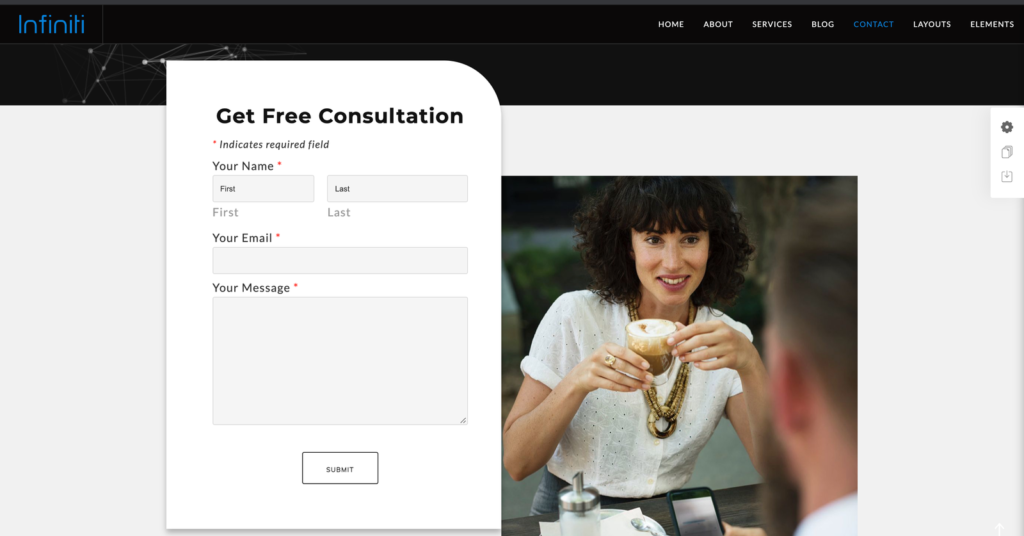
5. WordPress.com – Best for Blogging and Content-Heavy Sites
WordPress.com is one of the most popular platforms for bloggers and businesses that want content-driven websites. It’s not to be confused with WordPress.org (the self-hosted version), but it still offers robust customization options and a range of plugins.
- Ease of Use: WordPress.com is relatively easy to use for beginners, although there’s a bit of a learning curve if you want more advanced customizations. The block-based editor simplifies content creation.
- Pricing: WordPress.com offers a free plan, with paid plans starting at $5/month. The higher-tier plans offer more customization options and the ability to install plugins.
- Design Options: WordPress.com offers hundreds of themes, which can be customized with the built-in editor. For advanced users, there’s an option to add custom CSS.
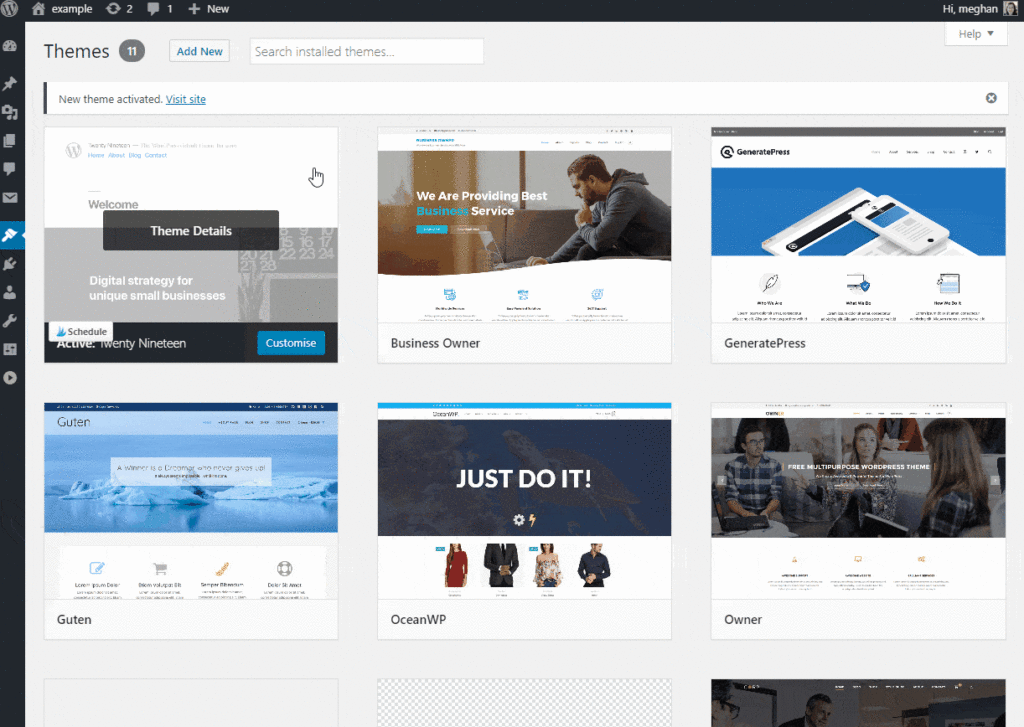
- SEO Features: WordPress.com includes solid SEO tools, with the ability to edit meta descriptions, alt-text, and more. Advanced SEO features are available on higher-tier plans.
- E-commerce Capabilities: While not as robust as Shopify, WordPress.com supports e-commerce through plugins like WooCommerce, allowing you to add a store to your site.
6. GoDaddy Website Builder – Best for Speed and Simplicity
GoDaddy is best known for its domain registration services, but its website builder is also worth considering if you’re looking for a simple and fast solution. It’s a good choice for small businesses that need to get online quickly.
- Ease of Use: GoDaddy’s website builder is designed for simplicity. It offers an ADI (Artificial Design Intelligence) tool that helps users create a site in minutes by answering a few questions.
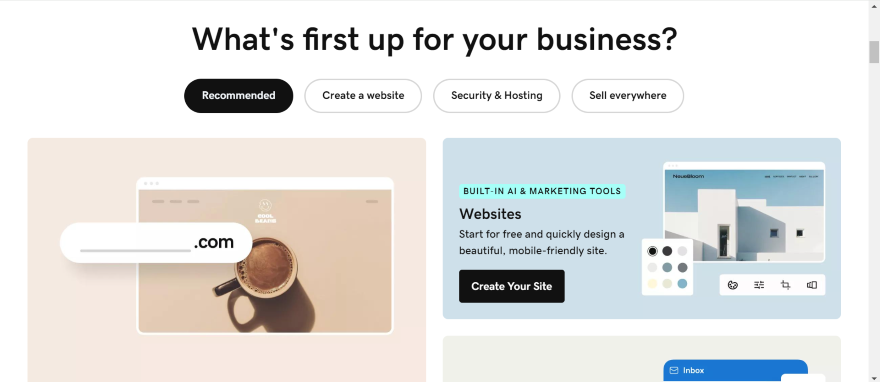
- Pricing: Plans start at $9.99/month, which includes hosting and SSL certificates.
- Design Options: GoDaddy offers a decent selection of templates, though they are less customizable compared to platforms like Wix or Squarespace.
- SEO Features: GoDaddy provides basic SEO tools such as automatic meta tag creation and keyword suggestions.
- E-commerce Capabilities: GoDaddy’s e-commerce tools are simple but effective, with features like inventory management and PayPal integration.
Conclusion: Choosing the Best Website Builder for Your Small Business
Selecting the best website builder for small business comes down to understanding your priorities—whether that’s ease of use, design flexibility, e-commerce features, or budget.
- Wix stands out for its ease of use and customization, making it a great option for beginners who want to create a professional website without any coding knowledge.
- Squarespace is perfect for those who value design, offering stunning templates and great customization for visually-driven businesses.
- Shopify is the go-to choice for small businesses focused on e-commerce, with powerful tools designed to help you grow an online store.
- Weebly offers an affordable, simple solution for small businesses looking to establish an online presence quickly and with minimal fuss.
- WordPress.com excels in content management, making it ideal for businesses that need a content-heavy site or a blog.
Each platform offers unique strengths, so think about your business goals and technical comfort when choosing. A free trial (offered by most builders) can also help you get a feel for the platform before committing.
Ultimately, the right website builder will allow your small business to thrive online, helping you attract customers, showcase your brand, and grow your business. By considering factors like ease of use, pricing, SEO, and scalability, you’ll be well on your way to picking the perfect platform.
Affiliate Disclaimer: Some of the links in this article are affiliate links, which means I may earn a commission if you click on the link and make a purchase. Please note that I only recommend products or services that I genuinely believe in and have personally experienced. Your purchase helps support my work in providing valuable content to readers like you. Thank you for your support!

